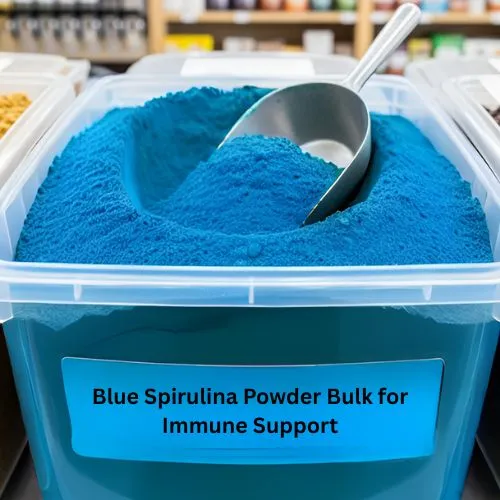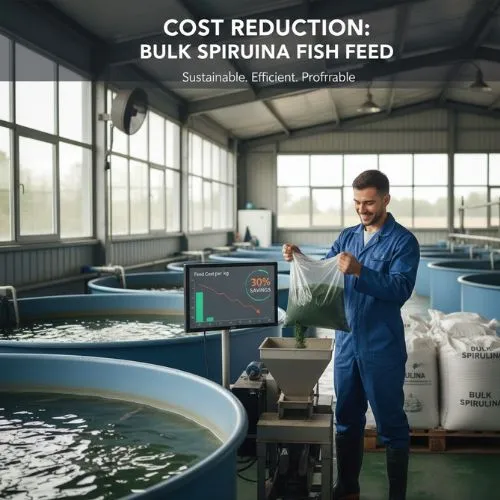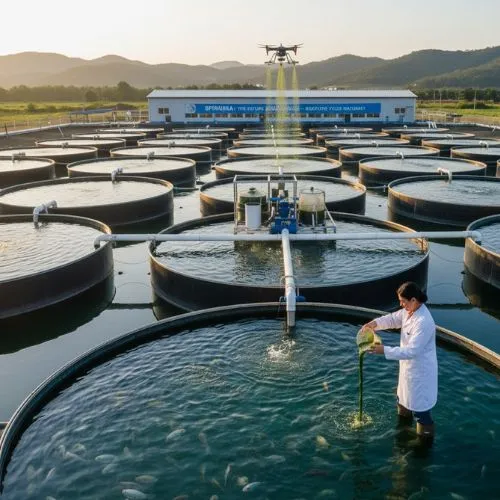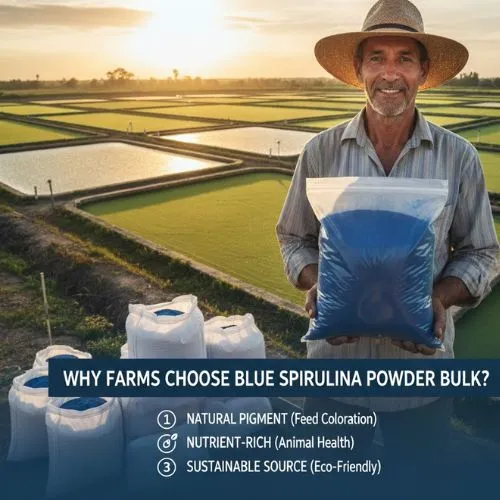What are the economic benefits of using spirulina in aquaculture?
Spirulina, a nutrient-dense blue-green algae, has emerged as a game-changer in the aquaculture industry. As fish farmers seek sustainable and cost-effective solutions to enhance their operations, spirulina has proven to be a valuable asset. This article explores the significant economic advantages of incorporating spirulina, particularly blue spirulina powder bulk, into aquaculture practices.

Cost savings from bulk spirulina in fish feed
Reduced reliance on expensive protein sources
One of the primary economic benefits of using spirulina in aquaculture is the substantial reduction in feed costs. Traditional fish feeds often rely heavily on expensive protein sources such as fishmeal and soybean meal. By incorporating blue spirulina powder bulk into feed formulations, aquaculture operations can significantly decrease their dependence on these costly ingredients. Spirulina boasts a protein content of up to 70%, making it an excellent alternative to conventional protein sources. This substitution translates to notable savings in feed expenses, ultimately improving the overall profitability of fish farming ventures.
Enhanced feed conversion efficiency
Spirulina's nutrient-rich profile contributes to improved feed conversion efficiency in aquaculture. The high digestibility of spirulina allows fish to absorb a greater proportion of nutrients from their feed, resulting in faster growth rates and reduced feed waste. This enhanced efficiency means that fish farmers can achieve optimal growth with less feed input, further reducing production costs. The economic impact of improved feed conversion is particularly significant in large-scale aquaculture operations, where even small improvements in efficiency can lead to substantial cost savings over time.
Extended shelf life of feed
Incorporating blue spirulina powder bulk into fish feed formulations can extend the shelf life of the feed. Spirulina contains natural antioxidants that help preserve the quality of the feed, reducing the risk of spoilage and nutrient degradation during storage. This extended shelf life allows aquaculture operations to purchase feed in larger quantities, potentially benefiting from bulk discounts and reducing the frequency of feed orders. Additionally, the improved stability of spirulina-enriched feed minimizes the need for preservatives, further contributing to cost savings and aligning with consumer preferences for natural feed ingredients.

Boosting aquaculture yields with spirulina
Accelerated growth rates
The integration of spirulina into aquaculture feed has demonstrated remarkable effects on fish growth rates. The comprehensive nutrient profile of spirulina, including essential amino acids, vitamins, and minerals, promotes rapid and healthy growth in various fish species. Faster growth rates translate to shorter production cycles, allowing fish farmers to bring their products to market more quickly. This accelerated time-to-market not only improves cash flow but also increases the overall production capacity of aquaculture facilities. The economic impact of enhanced growth rates is particularly significant in species with high market value, where even marginal improvements in growth can result in substantial financial gains.
Improved fish health and survival rates
Spirulina's rich array of bioactive compounds contributes to enhanced fish health and immune function. The inclusion of blue spirulina powder bulk in aquaculture diets has been associated with reduced incidence of diseases and improved resistance to environmental stressors. This improved health status translates to higher survival rates throughout the production cycle, minimizing losses due to mortality. The economic benefits of increased survival rates are twofold: firstly, it ensures a higher yield of marketable fish from each production cycle, and secondly, it reduces the costs associated with disease management and treatment. By promoting robust fish health, spirulina helps aquaculture operations maintain consistent production levels and reduce the financial risks associated with disease outbreaks.
Enhanced product quality and market value
The use of spirulina in aquaculture feed can significantly enhance the quality and nutritional value of the final product. Fish raised on spirulina-enriched diets often exhibit improved flesh color, texture, and nutritional composition. These quality enhancements can command premium prices in the market, especially among health-conscious consumers seeking nutrient-dense seafood options. The vibrant pigments in blue spirulina powder bulk, particularly phycocyanin, can impart an attractive color to fish flesh, further increasing its market appeal. By producing higher-quality fish products, aquaculture operations can differentiate themselves in competitive markets and potentially access new, lucrative market segments.

Why farms choose blue spirulina powder bulk?
Consistent quality and purity
Blue spirulina powder bulk offers aquaculture farms a reliable and consistent source of high-quality nutrients. Reputable blue spirulina powder manufacturers, such as YANGGE BIOTECH, employ advanced extraction methods to ensure the purity and potency of their products. The consistency in quality allows fish farmers to maintain standardized feed formulations, crucial for achieving predictable growth rates and product quality. The use of bulk blue spirulina powder also minimizes the risk of contaminants often associated with lower-quality algal products, safeguarding the health of fish stocks and the safety of the final product for human consumption.
Scalability and cost-effectiveness
Opting for blue spirulina powder bulk provides aquaculture operations with significant economies of scale. Purchasing in large quantities not only reduces the per-unit cost of the ingredient but also streamlines the procurement process. This scalability is particularly beneficial for medium to large-scale fish farms looking to optimize their feed costs without compromising on quality. The ability to source blue spirulina powder in bulk quantities ensures a steady supply for continuous production, reducing the risk of feed shortages and associated production disruptions. Furthermore, the concentrated nature of blue spirulina powder allows for efficient storage and handling, minimizing logistical costs associated with feed management.
Versatility in feed formulation
Blue spirulina powder bulk offers unparalleled versatility in feed formulation. Its powdered form allows for easy incorporation into various types of fish feeds, including pellets, flakes, and extruded feeds. This flexibility enables aquaculture nutritionists to fine-tune feed formulations to meet the specific nutritional requirements of different fish species and life stages. The ability to precisely control the inclusion rate of blue spirulina powder in feed mixtures allows for optimized nutrient profiles tailored to maximize growth, health, and product quality. This versatility in feed formulation empowers fish farmers to adapt their feeding strategies to changing market demands or production goals, enhancing the overall agility and competitiveness of their operations.

Conclusion
The economic benefits of using spirulina in aquaculture are multifaceted and significant. From reducing feed costs and improving growth rates to enhancing product quality and market value, spirulina offers a compelling solution for fish farmers seeking to optimize their operations. The choice of blue spirulina powder bulk, in particular, provides additional advantages in terms of quality, scalability, and versatility. As the aquaculture industry continues to evolve, the strategic incorporation of spirulina stands out as a key factor in driving economic success and sustainability.
Are you ready to revolutionize your aquaculture operation with high-quality blue spirulina powder bulk? YANGGE BIOTECH, a leading blue spirulina powder manufacturer, offers premium-grade products tailored to meet the demanding needs of the aquaculture industry. Our commitment to quality, innovation, and customer satisfaction ensures that you receive the best blue spirulina powder bulk for your fish farming needs. Contact us today at info@yanggebiotech.com to explore how our products can enhance your aquaculture productivity and profitability.
FAQ
Q: Can we get some samples to test before purchasing?
A: Of course, we can provide free samples of 20 to 100 grams, but the shipping cost is at the customer's expense. The shipping cost can be deducted from the next order, or the samples can be sent through your courier account.
Q: Do your products have relevant certifications?
A: Yes, our products are certified for HALAL, ISO, HACCP, Kosher, and other certifications.
Q: What is the minimum order quantity (MOQ)?
A: Small batches of samples can be customized according to your requirements.
Q: Do you offer OEM and ODM services? Can the formula be customized based on our own?
A: Of course, we provide ODM and OEM services to many customers. Our product range includes softgels, capsules, tablets, sachets, granules, and private label services. Simply contact us and let us know your requirements. Our experienced R&D team can also develop new products with specific formulas.
Please contact us to design your own branded products.
Q: How do you handle quality complaints?
A: First, we have a comprehensive quality control SOP. We provide authoritative third-party inspection reports for almost all products before shipment to minimize the possibility of quality issues. Second, we have a comprehensive return and exchange procedure. If there is a genuine quality dispute, we will strictly follow the SOP.
Q: How do you ship? How long does delivery take?
A: For small orders, we typically use DHL, UPS, EMS, FedEx, or TNT. Delivery typically takes 3-7 days. We also offer air and sea freight services. We have a strong freight forwarding team and can provide you with a one-stop service, including DDP and DDU.
Q: What are your payment terms?
A: 100% prepayment, payable by T/T, Western Union, MoneyGram, or PayPal.
Q: What is the shelf life of your products?
A: 2 years with proper storage.
Q: Is the packaging environmentally friendly?
A: We attach great importance to environmental protection and are constantly improving our product packaging. Some products are packaged in recyclable paper. Packaging materials are carefully selected to ensure product safety during transportation and storage, and to minimize environmental impact. We are committed to achieving a balance between environmental friendliness and practicality in our product packaging, and to contributing to sustainable development.
References
1. Johnson, E. A., & Schroeder, W. A. (2018). Microbial carotenoids from algae: Methods and protocols. New York: Humana Press.
2. Naylor, R. L., Hardy, R. W., Bureau, D. P., Chiu, A., Elliott, M., Farrell, A. P., ... & Nichols, P. D. (2009). Feeding aquaculture in an era of finite resources. Proceedings of the National Academy of Sciences, 106(36), 15103-15110.
3. Sili, C., Torzillo, G., & Vonshak, A. (2012). Arthrospira (Spirulina) platensis. In Ecology of Cyanobacteria II (pp. 677-705). Springer, Dordrecht.
4. Tacon, A. G., & Metian, M. (2015). Feed matters: Satisfying the feed demand of aquaculture. Reviews in Fisheries Science & Aquaculture, 23(1), 1-10.
5. Vonshak, A. (Ed.). (2017). Spirulina platensis (Arthrospira): Physiology, cell-biology and biotechnology. CRC Press.

Based on your location and order quantity, you will have the opportunity to receive a limited time free shipping promotion!

Who we are


